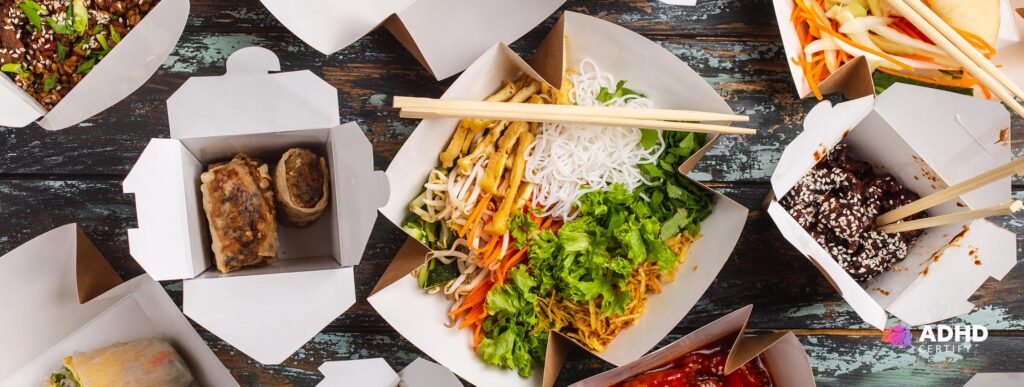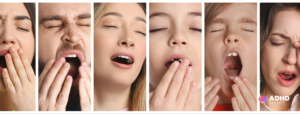With summer comes freedom, and the loss of routine. For people with ADHD, that can mean skipped meals, snack overload, and a sense that everything’s just slightly off track.
Is it really that connected? It turns out it is.
According to guidance from the NHS Trust TEWV, quick-release sugars can lead to energy spikes and crashes, which may affect attention span, memory, and behaviour in children with ADHD.
So yes, food matters, not as a cure, but as a factor that can help keep symptoms calmer and energy steadier. In fact, small changes like healthy ADHD snacks and balanced meals can play a role in supporting focus, especially during long summer days.
And the best part?
You don’t need a PhD in nutrition. Just some mindful swaps and light ADHD meal planning to support those summer rhythms.
Let’s break down how seasonal habits and food choices can either trip up or support attention, mood, and energy, starting with a look at the role of diet and ADHD and sugar.
How Nutrition Affects ADHD in Summer
Understanding how seasonal routines and food choices affect ADHD symptoms can help families plan more supportive meals.
The Role of Nutrition in Focus and Mood Regulation
When structure slips, eating becomes reactive which results in grabbing quick fixes instead of balanced meals. For people with ADHD, that nutritional shift can quietly derail focus and mood. The brain relies on a steady supply of nutrients to function well.
“Want to understand how ADHD shapes real-life eating habits, from impulsive snacking to skipped meals? Read our evidence-based guide on the relationship between ADHD and nutrition, with strategies for both adults and children.”
Skipping meals or relying on sugary snacks can cause blood sugar crashes, which may lead to irritability, fatigue, or trouble concentrating.
Including protein, fibre, and healthy fats in meals can help keep energy levels stable.
It’s not about perfection, it’s about rhythm.
Small, steady improvements in how and when you eat can support the ADHD brain and help build more consistent focus and mood regulation.
Common Summer Challenges: Sugar, Stimulants, and Skipped Meals
Warm weather often means more fizzy drinks, fewer sit-down meals, and a fridge raided in no particular order. These patterns can lead to excess sugar, irregular eating, and, in some cases, too much caffeine, especially from iced teas, energy drinks, or chocolate.
For individuals with ADHD, this kind of unstructured eating can heighten impulsivity or trigger energy crashes that make it harder to regulate mood and behaviour.
“According to Gary Brecka, a leading human biologist and biohacker, removing processed and fortified foods from the diet for even one week can help improve clarity and focus in individuals with ADHD. Brecka recommends prioritizing whole foods, leafy greens, and omega-3-rich options to support steady energy and attention”
Choosing healthy ADHD snacks like yoghurt, nuts, or oat-based bars between meals can help fill the gaps and steady blood sugar.
The Link Between ADHD and Food Sensitivities
Some families notice that certain foods seem to affect ADHD symptoms, whether it’s dairy, gluten, or additives like artificial colours. While the evidence is mixed, there’s enough lived experience to suggest sensitivities play a role for some people.
If you suspect food is triggering behaviour shifts, speak to a UK based dietitian familiar with ADHD diet tips. They can help guide safe, evidence-based changes without cutting out important nutrients.
Healthy ADHD-Friendly Summer Snacks
Choosing nutrient-dense, easy-to-prepare snacks can make a big difference in managing energy and attention levels.
Protein-Packed Bites
Protein helps regulate blood sugar and keeps energy more stable throughout the day. For healthy ADHD snacks, think grab-and-go: boiled eggs, cheese sticks, yoghurt pouches, hummus with oatcakes, or nut butter on apple slices (check for school-safe options if nut-free).
Complex Carbohydrates for Sustained Energy
Simple carbs may spike and crash energy, not ideal for focus. Instead, go for slow-release carbs like whole grain crackers, oat-based bars, or mini rice cakes topped with banana. These are easy wins in any ADHD snack box.
Fruits and Veggies in Fun Formats
Make fibre-rich foods more tempting; try frozen grapes, sliced peppers with dip, fruit skewers, or mini cucumbers. Keep a cold box stocked for outings. Kids (and adults) often eat better when it looks colourful and snack-sized.
Before we jump into snack box ideas, take a moment to browse the visual ADHD Meal Planning Guide created by ADHD Certify in collaboration with Angela Ariella, Registered Associate Nutritionist (ANutr). It breaks down why food matters for ADHD, how to reduce cooking stress, and what makes meal prep easier when executive function is low or sensory overload kicks in.
ADHD-Friendly Snack Box Ideas for Day Trips and Holidays
Mix protein + fibre + carbs:
- Whole grain wrap pinwheels with turkey and spinach
- Carrot sticks and houmous
- Cheese cubes and grapes
- Oat biscuits with a small pot of yoghurt
Use a bento-style box to reduce overwhelm and make choices easier. This kind of ADHD-friendly summer snacks setup can keep energy more consistent through long afternoons.
Planning a day out? Our guide on summer travel tips for families with ADHD includes packing strategies, sensory tools, and coping ideas to make outings smoother.
ADHD-Smart Meal Planning for Summer
Simple, structured meal planning reduces stress and supports stable blood sugar and behaviour throughout the day.
Planning Ahead for BBQs, Picnics, and Day Trips
Pack balanced options early; sandwiches with protein, chopped veggies, and a cold drink. Predictable choices reduce last-minute snack spirals and support ADHD meal planning on the go.
Easy Make-Ahead Meals for Busy Summer Days
Batch-cook pasta salads, wraps, or mini frittatas. Keep options visible in the fridge for easy access. This reduces decision fatigue; a common challenge in ADHD and nutrition routines.
Hydration and ADHD: Don’t Forget Fluids
Dehydration worsens focus and energy dips. Set reminders to drink water. Add fruit slices or use clear bottles so you can see how much you’ve had.
Involving Children in Food Choices and Prep
Let kids pick ingredients, help stir, or build their own lunchbox. This builds buy-in and reduces resistance.
Supporting Consistent Eating Habits
Maintaining regular eating times can help regulate mood and energy, even with a flexible summer schedule.
Building a Predictable Meal and Snack Schedule
Irregular eating can lead to blood sugar dips, low energy, and crankiness; all of which can intensify ADHD symptoms.
Even in summer, try to keep rough mealtimes in place:
- Breakfast within an hour of waking
- Lunch around midday, and an afternoon snack.
Predictability helps regulate both mood and appetite.
Using Visuals or Timers to Signal Mealtimes
Visual timetables or simple alarms can cue the brain to switch tasks. For children, a visual clock or meal chart makes time more tangible. For adults, using reminders on phones or digital assistants can reduce forgetfulness and support ADHD meal planning without micromanaging the day.
Making Mealtimes Calmer for Kids with Sensory Sensitivities
Noise, smells, or certain food textures can be overwhelming. Try dimmer lighting, quieter spaces, and smaller portions served on neutral plates. Allowing kids to touch or explore food without pressure can reduce anxiety and build trust around eating, especially useful for families following ADHD diet tips.
If your child is also autistic or has overlapping sensory needs, this article from Autism Detect on supporting autistic children through summer transitions offers additional strategies around routine, emotional regulation, and calming environments.
When to Seek Professional Nutrition Advice
Some children and adults with ADHD may benefit from a personalised approach to nutrition.
Signs That Nutritional Support May Be Needed
If someone is regularly skipping meals, showing extreme food aversions, struggling with appetite loss (possibly linked to medication), or showing signs of nutritional deficiency (like fatigue or frequent illness), it’s time to seek help. Behavioural changes after eating certain foods can also be a clue.
Working with a Dietitian Familiar with ADHD
A dietitian who understands ADHD and nutrition can help tailor a plan that works with executive function challenges. They can support routines, safe food experimentation, and realistic meal prep, not just “ideal” diets that aren’t sustainable.
Cautions Around Restrictive Diets and Supplement Trends
Be cautious of elimination diets or supplements that promise to “treat” ADHD. Evidence is often limited, and restricting whole food groups can create more harm than good. Professional guidance ensures safety and balance in any dietary change.
Final Thoughts
Summer might throw routines off course, but with a bit of structure and a few realistic tweaks, nutrition can become a quiet support system for managing ADHD. Balanced snacks, steady meals, and flexible planning aren’t about being perfect, they’re about helping brains and bodies feel a little more in sync.
Everyone’s needs look different, and for some, food challenges might be part of a bigger picture. If you’re noticing ongoing struggles around focus, energy, or eating habits, whether in yourself or your child; it could be time to look a little deeper.
We offer adult ADHD assessments and child ADHD assessments to help you better understand what’s going on and what support makes sense. Wherever you are in the process, we’re here to help you take the next step with confidence and care.
Frequently Asked Questions
Is there a best diet for ADHD in children or adults?
There’s no one-size-fits-all “ADHD diet,” but patterns do matter. Balanced meals with regular sources of protein, complex carbohydrates, fibre, and healthy fats can help stabilise blood sugar and support attention and mood. For some individuals, minimising processed foods and added sugars may reduce behavioural spikes or crashes. Dietary needs can vary widely, so it’s best to observe what works and speak to a dietitian for tailored guidance.
Are there foods to avoid with ADHD medication?
Yes, some foods may affect how stimulant medications are absorbed or tolerated. Acidic foods and drinks (like citrus juice or fizzy drinks) can interfere with how certain medications work. Caffeine may amplify side effects like jitteriness or sleep trouble. Also, since stimulants can reduce appetite, it’s helpful to schedule meals when the medication’s effect is milder, such as early breakfast or evening dinner. If appetite loss is ongoing, consult your prescriber or a dietitian.
How can I get my child with ADHD to eat more vegetables?
For many children with ADHD, especially those with sensory sensitivities, vegetables can be a challenge. Try offering veggies in fun, pressure-free formats, like raw with dips, in smoothies, or cut into shapes. Let your child help choose, chop, or arrange them, which can increase interest.
Can certain nutrients improve focus for people with ADHD?
Some nutrients support brain function and may help with attention when part of a balanced diet. These include protein, omega-3 fatty acids, iron, zinc, magnesium, and B-vitamins. While no single food or supplement will “fix” focus, eating in a way that supports steady energy and cognitive health can make a real difference, especially when combined with consistent routines and ADHD-friendly strategies.




